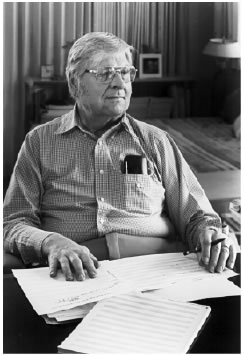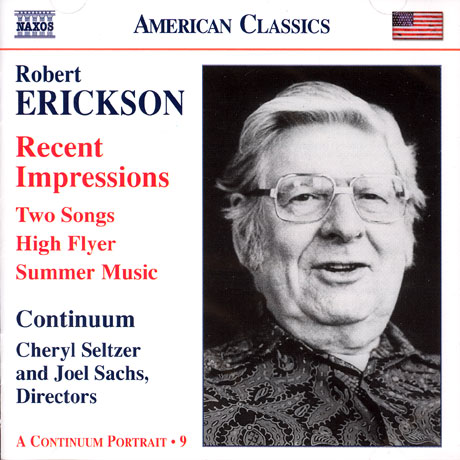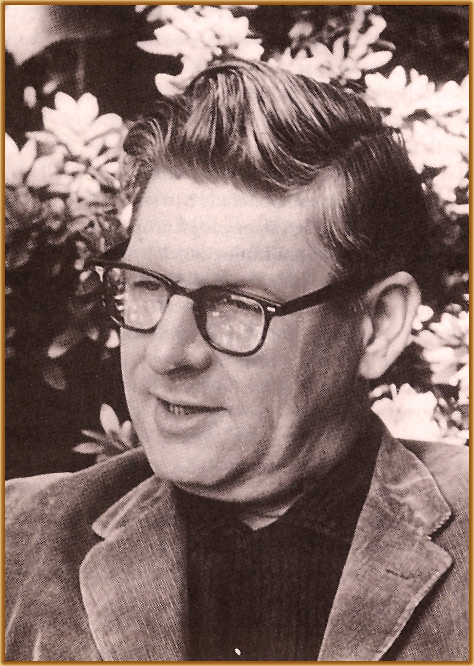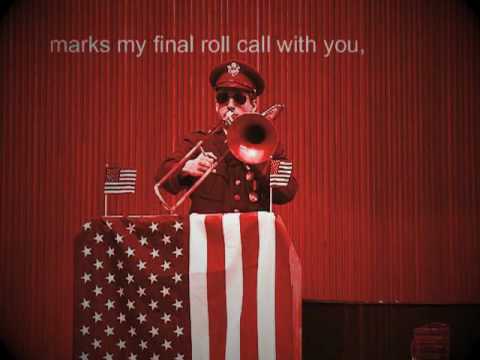

|
ROBERT ERICKSON
Composer, author, educator and co-founder of the UCSD Music Department. Born in Marquette, Michigan on March 7, 1917, Erickson learned piano and violin as a child, studied composition with May Strong in Chicago, and with Ernst Krenek at Hamline University in St. Paul, graduating in 1943. After three years in the Army he returned to Hamline, taking an M.A. in music in 1947, and immediately began distinguished careers as both a composer and a teacher of composition. A dedicated Modernist, Erickson was one of the first American composers to explore the "twelve-tone" system pioneered by the Austrian composer Arnold Schoenberg. By 1943 he had already modified that method to suit his own needs, and by the late 1950s he was evolving a more directly expressive, intuitive music in which, in his words, "craft, thought, and intuition are so merged that it is all one thing." For many years he experimented with specially-made percussion instruments, with extended vocal and instrumental techniques, with naturally occurring sounds, and with non-standard musical notation. He was one of the first American composers to work extensively with sounds recorded on tape, both for its own sake and as combined with live performers on conventional instruments; and he wrote distinguished music requiring improvisation, by both solo instruments and ensembles. In later years he moved away from the pioneering experiments of the 1960s and '70s toward a simpler, ultimately stripped-down style, characterized by frequent drones, long slow passages, and hypnotic rhythms which were influential on a number of younger "minimalist" composers. Erickson composed for virtually every medium except opera, and was performed and commissioned by the Minneapolis, San Francisco, Oakland, and Los Angeles Symphony Orchestras, the American Composers Orchestra, and such celebrated ensembles as the Arch Ensemble, Continuum, the Kronos Quartet, and SONOR. He received fellowships from the Ford Foundation and the Guggenheim Foundation and awards from the National Endowment for the Arts, the American Academy and Institute of Arts and Letters, and, in 1985, the Friedheim Award for chamber music for his string quartet Solstice, performed at the Kennedy Center. He taught at the College of St. Catherine's in St. Paul, the University of California at Berkeley, and the San Francisco Conservatory of Music, before becoming one of the founders of the Department of Music at the University of California, San Diego, in 1967. He also served as Music Director of KPFA Radio in Berkeley from 1955 to 1957 and as a director of the Pacific Foundation, KPFA's parent body, for several years thereafter. He was the teacher of Paul Dresher, Pauline Oliveros, Terry Riley, Loren Rush, Charles Shere, and Morton Subotnick, among others. Erickson published two books: The Structure of Music: A Listener's Guide in 1957 and Sound Structures in Music in 1975. Many of his compositions were recorded, and he was the subject of two biographies, by John MacKay and Charles Shere, both of which appeared in 1996. Music for Trumpet, Strings, and Tympani, Erickson's last composition written in 1990, was premiered at UCSD in November 1991 by trumpeter Edwin Harkins and the contemporary music ensemble, SONOR. For the last fifteen years of his life Erickson was confined to his Encinitas home, bedridden with polymyositis, and was unable to attend the premiere. He was married to the artist Lenore Erik-Alt. Erickson died on April 24, 1997. |
 BD: What about the recordings
—
do those please you?
BD: What about the recordings
—
do those please you? RE: Some, mm-hmm.
RE: Some, mm-hmm. RE: To each his own!
RE: To each his own!This
interview was held on the telephone on February 27, 1988.
Portions
were used (along with recordings) on WNIB 1992 and 1997. The
transcription was made and posted on this
website in 2011.
To see a full list (with links) of interviews which have been transcribed and posted on this website, click here.
Award - winning broadcaster Bruce Duffie was with WNIB, Classical 97 in Chicago from 1975 until its final moment as a classical station in February of 2001. His interviews have also appeared in various magazines and journals since 1980, and he now continues his broadcast series on WNUR-FM, as well as on Contemporary Classical Internet Radio.
You are invited to visit his website for more information about his work, including selected transcripts of other interviews, plus a full list of his guests. He would also like to call your attention to the photos and information about his grandfather, who was a pioneer in the automotive field more than a century ago. You may also send him E-Mail with comments, questions and suggestions.